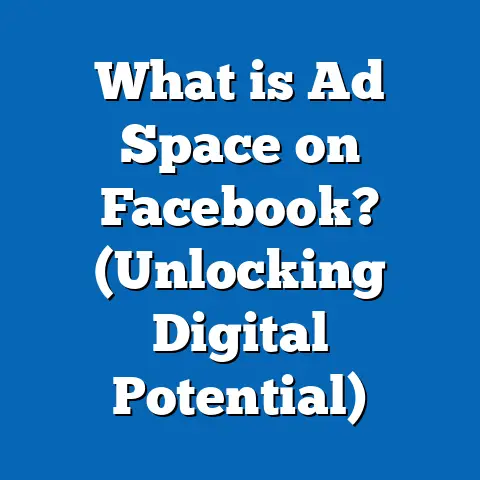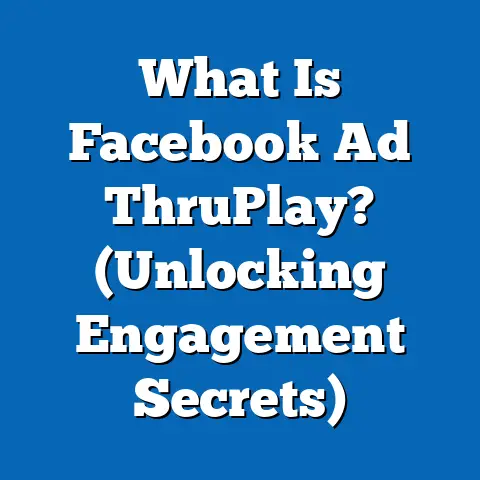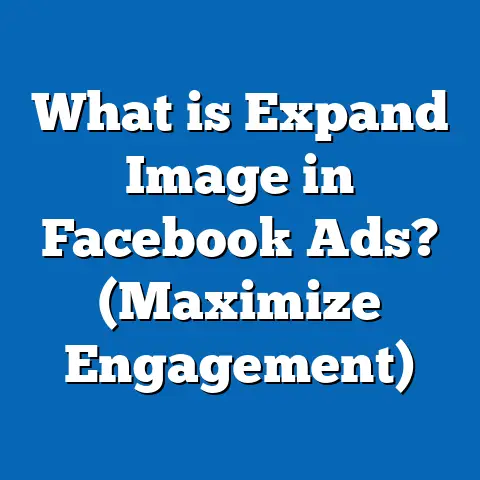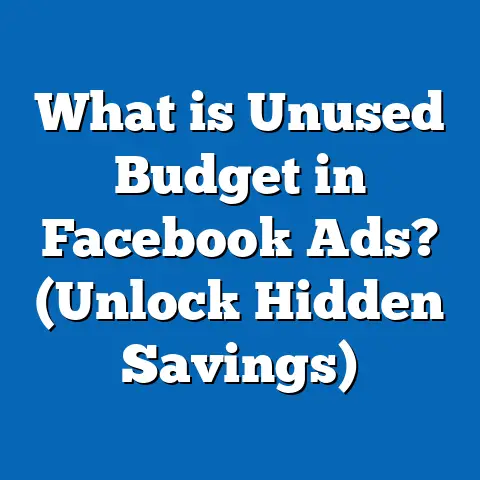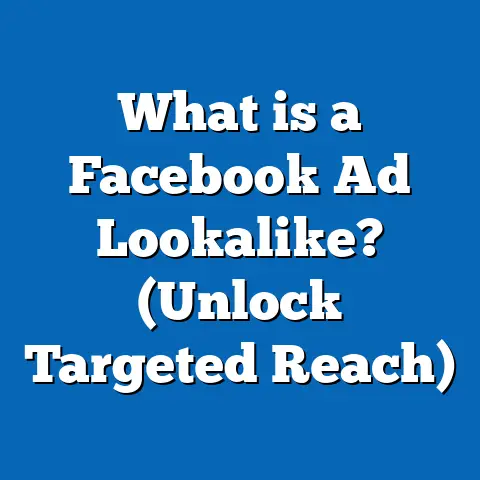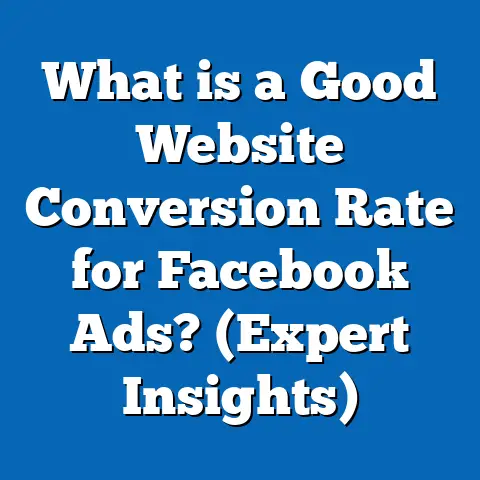What is Post Engagement on Facebook Ads? (Boost Your ROI!)
Introduction: Why Pet Businesses Should Care About Post Engagement on Facebook Ads
Imagine a local pet store trying to connect with pet owners in its community.
They post adorable pictures of puppies playing with new toys, hoping to catch the attention of dog lovers scrolling through Facebook.
But what if those posts don’t get noticed?
Or worse, what if they don’t inspire any interaction?
This is where post engagement on Facebook ads becomes a game-changer.
For pet-related businesses—whether pet shops, groomers, trainers, or veterinarians—engagement measures how well their content resonates with their audience.
It’s more than just likes and comments; it’s a direct indicator of how potential customers interact with your brand.
The higher the engagement, the better your chances of turning casual scrollers into loyal clients.
In this guide, we’ll explore what post engagement means in the context of Facebook ads, why it matters for your pet business, and how to optimize it to boost your return on investment (ROI).
What Is Post Engagement on Facebook Ads?
Post engagement refers to the total number of interactions users have with your Facebook ad or organic post.
These interactions include:
- Likes and reactions (love, wow, haha, sad, angry)
- Comments
- Shares
- Clicks on the post or its links
- Video views (if applicable)
Facebook counts all these actions to determine how engaged your audience is with your content.
Comments
Comments indicate deeper user involvement.
When users comment, they take time to share their thoughts or ask questions.
This is valuable because it creates conversations around your brand and builds community.
Shares
Shares amplify your content’s reach exponentially.
When someone shares your post, it appears in their friends’ newsfeeds, extending your brand’s exposure organically.
Clicks
Clicks can be on a link within the post, the image itself, or a call-to-action button.
Clicks often signal interest beyond simple emotional reactions.
Video Views
When using video ads or posts, Facebook tracks how long users watch.
Extended watch times reflect stronger engagement.
Why Post Engagement Matters for Facebook Ads
Engagement as a Signal of Relevance
Facebook’s advertising algorithm prioritizes posts that generate strong engagement because it interprets this as content users find relevant and valuable.
- Relevance Score (Ad Quality Ranking): Higher engagement positively affects this score.
- Ad Delivery: Facebook shows your ad to more people at a lower cost if engagement is high.
Impact on Cost Efficiency
Data from WordStream (2023) shows that ads with higher engagement experience:
- Up to 30% lower cost per click (CPC).
- Better overall ad performance due to optimized delivery.
Building Trust and Brand Loyalty
Engagement fosters connection.
When users comment or share stories related to your pet business, it creates social proof.
For example, a grooming salon receiving heartfelt comments about happy pets builds trust for new customers.
Driving Conversions Indirectly
Engagement doesn’t always translate immediately to sales but warms up potential customers by keeping your brand top-of-mind through ongoing interaction.
Deep Dive: How Facebook Measures Post Engagement
Facebook’s algorithm tracks these interactions in real-time and weighs their impact differently depending on ad objectives and formats.
1. Reactions and Likes
Reactions are quick emotional responses. According to Facebook data from 2024:
- “Love” and “Wow” reactions tend to increase reach more than simple likes.
- Reactions can improve the ad’s ranking by signaling positive sentiment.
2. Comments
Comments show active participation.
Facebook values comments because they lead to longer session times on the platform.
- Ads that spark conversations can see up to 20% better reach.
- Responding to comments improves user experience and encourages return engagement.
3. Shares
Shares are one of the most valuable types of engagement because they represent endorsements by users.
- A shared ad can reach 3x more people organically.
- Shares increase credibility as recommendations come from friends.
4. Clicks
Clicks indicate direct interest and are critical for traffic-driven campaigns.
- Click-through rate (CTR) is a key metric tied to engagement.
- Ads with higher CTR tend to have lower cost per conversion.
5. Video Views
For videos:
- Average watch time correlates with message retention.
- Videos watched for more than 10 seconds have 50% higher conversion likelihood according to Facebook Business Insights (2024).
Data-Backed Insights on Post Engagement Effectiveness
Engagement Boosts Ad Delivery Efficiency
Research by WordStream (2023) analyzed over 5 million Facebook ads globally and found:
- Ads with above-average engagement had CPC rates 30% below average.
- Higher engagement improved conversion rates by up to 25%.
Engagement Correlates With Higher Conversion Rates
HubSpot studies (2023) reveal that brands with engaging posts see:
- A 20–25% increase in conversion rates versus brands focusing only on impressions.
- 60% of consumers say they’re more likely to purchase after engaging with a brand’s social media content.
Audience Targeting Improves With Engagement Data
Facebook’s machine learning uses engagement signals to:
- Refine audience targeting dynamically.
- Show ads to users more likely to interact based on past behavior.
Case Study: A Pet Grooming Business Increasing ROI Through Post Engagement
Background: Paws & Claws Grooming Salon
A small grooming salon wanted to increase bookings through Facebook ads by improving post engagement.
Strategy:
- Created posts showing before-and-after grooming photos.
- Asked customers to share their pet grooming experiences in comments.
- Ran boosted posts targeting local pet owners aged 25–45.
Execution Details:
- Posts were published during peak activity hours.
- Responded promptly to all comments within one hour.
Results after 3 Months:
Key Takeaway:
By focusing on creating engaging content and actively responding to users, Paws & Claws lowered ad costs and increased bookings significantly.
How to Optimize Post Engagement on Facebook Ads
Optimizing post engagement requires a strategic approach combining creative content, targeting, timing, and interaction.
1. Use High-Quality Visuals
Pets are naturally photogenic.
Use clear, vibrant images or videos showcasing happy pets using your products or services.
Tips:
- Use close-up shots of pets’ faces showing emotions.
- Incorporate bright colors and natural lighting.
- Use short videos (15–30 seconds) demonstrating your services.
Example: A pet toy store using videos of dogs playing with new toys saw a 45% increase in video views compared to static images.
2. Craft Compelling Calls-to-Action (CTAs)
Encourage interaction with phrases like:
- “Tell us about your pet!”
- “Tag a friend who loves dogs.”
- “Comment your favorite dog breed.”
CTAs must be clear and aligned with the post’s goal—whether it’s to get comments, shares, or clicks.
3. Leverage User-Generated Content (UGC)
People trust content created by other customers more than branded posts.
How to use UGC:
- Request customers to share photos or stories featuring your products.
- Highlight selected customer posts in your ads or on your page.
Example: A pet food company ran a contest asking customers to post photos of their pets enjoying new flavors, resulting in a 70% increase in comments.
4. Post at Optimal Times
Analyze your audience insights in Facebook Business Suite to find when your followers are most active.
General guidelines:
- Weekdays between 1 PM and 4 PM often see higher engagement.
- Weekends may work better for lifestyle brands like pet stores when people have free time.
Scheduling posts during these windows maximizes visibility and interaction.
5. Use Interactive Formats
Facebook offers interactive options like polls, quizzes, and contests which invite participation.
Example: A local vet clinic ran a poll asking “Which pet do you prefer—cats or dogs?” This generated hundreds of votes and comments, boosting overall page engagement.
Comparing Post Engagement Across Platforms
Understanding how Facebook compares with other social media platforms helps refine strategy and budget allocation.
*Engagement rates vary by industry and audience size.
Facebook is ideal for pet businesses aiming for community growth combined with granular targeting options for local markets.
Advanced Concepts: Using Facebook’s Ad Tools to Track and Improve Engagement
Key Metrics in Facebook Ads Manager
To optimize campaigns effectively, marketers must understand key metrics related to engagement:
Monitoring these metrics regularly allows you to tweak creatives and audience settings for better results.
A/B Testing for Engagement
Testing different versions of ads helps identify which elements drive the most interaction:
- Test different images or videos.
- Try various CTAs.
- Experiment with audience segments.
For example: A pet toy brand tested two videos—one showing dogs playing indoors vs outdoors—and found indoor play videos had 25% higher engagement among urban audiences.
Practical Example: Step-by-Step Campaign to Boost Post Engagement for a Pet Store
Here’s a detailed campaign outline designed for maximum engagement:
- Objective: Increase engagement around a new line of eco-friendly pet toys.
- Creative: Short video montage showing happy dogs playing with toys at home.
- Targeting: Local pet owners aged 18–50 within a 20-mile radius.
- Budget: $500 spread over two weeks.
- CTA: “Comment your dog’s favorite toy below!”
- Post Timing: Scheduled for weekdays between 2 PM–4 PM based on audience data.
- Engagement Strategy: Respond promptly to every comment within one hour.
- Measurement: Track daily engagement rate and CPE; adjust targeting if necessary.
- Follow-up: Retarget engaged users with special offers after campaign ends.
Latest Trends in Facebook Post Engagement for Pet Businesses (2024)
Staying current helps maintain competitive advantage:
Increased Use of Reels and Stories
Short-form video content is dominating social media:
- Facebook Reels generate up to 20% more engagement than traditional videos.
- Stories offer real-time interaction opportunities via polls and Q&As.
Pet businesses can showcase quick tips or behind-the-scenes glimpses via these features.
AI-Powered Creative Tools
Facebook now offers AI suggestions for ad copy and image optimization which can help refine messaging based on user behavior patterns.
Focus on Community Groups
Ads linked to relevant groups tend to get better engagement due to shared interests among members.
Example: A pet adoption center targeting local animal rescue groups saw a 50% increase in shares and comments when promoting adoption events.
Enhanced Shopping Features on Facebook
Direct product tagging in posts lets followers shop without leaving the platform — increasing click-throughs and conversions from engaged users.
Common Mistakes That Reduce Post Engagement
Avoid these pitfalls:
- Ignoring Comments: Not responding discourages further interaction.
- Over-Promoting: Too many sales-focused posts turn off audiences seeking value or entertainment.
- Poor Visual Quality: Blurry or unappealing images reduce clicks and shares.
- Irrelevant Targeting: Showing ads to uninterested audiences lowers engagement drastically.
- No Call-To-Actions: Without prompts, users may not know how you want them to engage.
Tools To Help Track and Improve Your Post Engagement
Using the right tools simplifies monitoring and optimization:
How Businesses Can Measure ROI From Post Engagement
Calculating ROI from engagement involves connecting interactions back to business goals like sales or leads.
Formula:
ROI=Revenue from Campaign−Cost of CampaignCost of Campaign×100\text{ROI} = \frac{\text{Revenue from Campaign} – \text{Cost of Campaign}}{\text{Cost of Campaign}} \times 100
However, since engagement often plays an indirect role:
- Track lead generation or booking increases after campaigns with high engagement.
- Measure website traffic from engaged users clicking through ads.
- Use conversion pixels on websites to attribute purchases back to engaged audiences.
- Monitor customer lifetime value improvements driven by repeat buyers from engaged followers.
Summary: Why Post Engagement Is Crucial for Your Pet Business on Facebook Ads
- It measures how well your content resonates with your audience.
- High engagement improves ad relevance scores and lowers costs.
- Engaged audiences are more likely to convert into loyal customers.
- Strategies like quality visuals, CTAs, UGC, timing optimization, and interactivity boost engagement.
- Using Facebook’s metrics tools helps track performance and refine campaigns.
- Staying updated with trends like Reels and AI tools keeps you competitive.
For pet businesses aiming to grow locally or nationally through digital marketing, mastering post engagement on Facebook is key to maximizing advertising ROI while building meaningful customer relationships.
If you want me to expand any section further or add specific templates/examples tailored for particular pet business niches like veterinary clinics or pet trainers, just ask!

